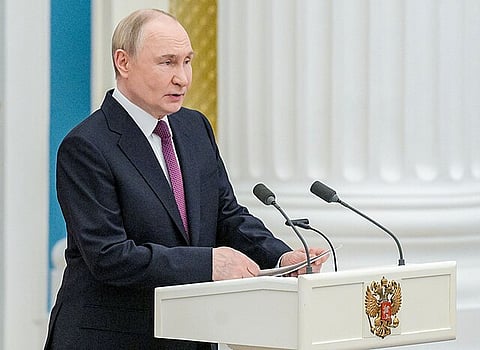

Russian President Vladimir Putin stated that Russia is prepared to let the New START nuclear treaty expire if the United States shows no interest, emphasizing that Russia's security is ensured by its ongoing development of new strategic weapons.
President Putin, speaking to reporters at a summit in Tajikistan, framed Russia's position as one of pragmatic openness to dialogue, contingent on American reciprocity. He stated that Russia is willing to voluntarily adhere to the warhead limits of the New START treaty for one year after its expiration in February 2026, but only if the United States does the same. He characterized this as a measure to avoid a further strategic arms race and ensure predictability. Putin expressed that a complete collapse of the arms control framework would be "a shame," but assured that Russia feels confident about its nuclear shield and that the U.S. declining to extend the agreement is "not a big deal for us".
Amid the uncertainty surrounding the treaty, President Putin revealed that Russia is actively developing and testing new-generation nuclear weapons. He announced that Russia would soon have the chance to announce a new strategic weapon, following successful tests. While not providing specific details, this statement aligns with Russia's known projects, such as the nuclear-powered Burevestnik cruise missile and the Poseidon nuclear torpedo. Putin asserted that "the sophistication of our nuclear deterrence systems is higher than that of any other nuclear state," underscoring Russia's commitment to advancing its strategic capabilities regardless of diplomatic outcomes.
For the second time in a week, President Putin addressed the possibility of other nuclear powers conducting live nuclear tests, warning that Russia would respond in kind if such tests occur. He noted that while computer simulations are used, there is a temptation among some experts to conduct real, full-scale tests to verify weapon effectiveness. He stated that from a security perspective, such tests would be "good" for Russia, but acknowledged they would be negative for efforts to curb a global arms race. He directly linked the issue of testing to the New START negotiations, stating that extending the treaty "for at least a year is a good idea" in this context.
The New START treaty, which limits the United States and Russia to 1,550 deployed strategic warheads and 700 deployed missiles and bombers, is the last major nuclear arms control agreement between the two nations. Its potential expiration occurs amidst heightened tensions between Russia and the West. The Kremlin has specifically cited U.S. developments like the "Golden Dome" missile defense project, which it views as destabilizing, as a factor that could nullify efforts to maintain the strategic balance. While U.S. President Donald Trump has verbally called Putin's extension proposal a "good idea," Washington has not yet provided a formal agreement.